Achieving a Healthy Period: What to Expect After Stopping Hormonal Birth Control

July 12, 2023
Essential Takeaways
- You can have a healthy, symptom-free period after stopping hormonal birth control.
- Stopping hormonal birth control can lead to changes in menstrual cycle regularity, flow, and timing, as well as Hormonal fluctuations which can cause side effects such as breast tenderness, mood swings, acne, and changes in libido as the body adjusts to the absence of synthetic hormones.
- Other potential effects may include the resumption of ovulation, the return of PMS symptoms, and the potential recurrence of side effects related to conditions like endometriosis or migraines. It's important to consult with a healthcare provider for personalized guidance and support during this transition.
Can I get a healthy period after stopping hormonal birth control?**
The short answer:
Yes, it is possible to have a healthy period after stopping hormonal birth control.
Let’s look at some side effects & changes in women's health:
When you stop using hormonal birth control, you may notice changes in your menstrual cycle. Irregular periods are a common occurrence, with variations in duration, flow, and the time between periods. Your body needs time to readjust its natural hormone production and regain its usual rhythm.
Hormonal fluctuations can lead to symptoms that may occur after discontinuation include PMS symptoms like bloating, mood swings, breast tenderness, acne breakouts, changes in libido or food cravings. These symptoms may become more noticeable or return after stopping hormonal birth control pills.
Stopping hormonal birth control pills can also allow for the resumption of ovulation, which may result in ovulation-related symptoms such as mild pelvic pain, changes in cervical mucus, or shifts in basal body temperature. This is particularly relevant for those who were not ovulating while using hormonal (oral) contraceptives.
It's important to note that everyone's experience can be different, and some women may have a quicker return to regular periods while others may take longer. The time it takes for your menstrual cycle to regulate can depend on factors such as your body's individual response to hormonal changes, the type of birth control you were using, and your overall health.
After discontinuing hormonal birth control methods like birth control pills, skin patches, mini-pills, vaginal rings or hormonal intrauterine devices (IUDs), it's common to experience changes in symptoms as your body adapts to the absence of synthetic hormones. The use of estrogen and progestin in hormonal (oral) contraceptives can have various side effects and affect different aspects of your reproductive health.
It's crucial to consider the potential risks associated with the different forms of hormonal birth control, such as an increased risk of blood clots, especially with certain formulations. Estrogen-containing contraceptives, particularly combination pills, may carry a higher risk of blood clots, heart attacks, and strokes. It's important to discuss these risks with your healthcare provider to make informed decisions about your method of birth control.
If you were using hormonal birth control to manage conditions like endometriosis, migraines, ovarian cysts, or to regulate your menstrual cycle, discontinuing it may lead to a return of symptoms. It's advisable to consult with your healthcare provider to explore alternative treatment options that can address your specific health concerns.
Good To Know: What is Estrogen? Estrogen is a key hormone that plays a significant role in female reproductive health and the overall well-being of women throughout their lives. Estrogen is a group of female sex hormones that play a vital role in the development and functioning of the female reproductive system. It is primarily produced by the ovaries, although small amounts are also synthesized in the adrenal glands and fat cells. Estrogen is responsible for the development of secondary sexual characteristics in females, such as breast growth, widening of the hips, and the growth of pubic and underarm hair during puberty. It also plays a crucial role in regulating the menstrual cycle, thickening the lining of the uterus (endometrium) in preparation for pregnancy, and promoting the maturation of eggs in the ovaries. Apart from its reproductive functions, estrogen has an impact on various other systems in the body. It helps maintain healthy bones by promoting calcium absorption and inhibiting bone breakdown. Estrogen also plays a role in maintaining healthy cholesterol levels, supporting cardiovascular health, and influencing mood and cognitive function.
Some common side effects that women may experience after stopping hormonal birth control include:
1. Irregular periods: It's normal for your menstrual cycle to become irregular after stopping hormonal birth control. Your periods may be shorter or longer than usual, and the time between periods may vary. It can take several months for your cycle to regulate.
2. Changes in menstrual flow: The flow of your periods may change after stopping hormonal birth control. Some women may experience heavier or lighter periods than they had while using birth control.
3. Hormonal fluctuations: Your body's natural hormonal balance may take some time to restore. This can lead to side effects such as breast tenderness, mood changes, acne breakouts, or changes in libido.
4. Ovulation-related symptoms: If you were not ovulating while using hormonal birth control, you may start experiencing ovulation-related symptoms after stopping. These side effects can include mild pelvic pain, cervical mucus changes, or changes in basal body temperature.
5. PMS symptoms: Premenstrual syndrome (PMS) symptoms, such as bloating, mood swings, breast tenderness, or food cravings, may become more noticeable or return after stopping hormonal birth control.
6. Fertility changes: After discontinuing hormonal birth control, it's possible to regain fertility and become capable of getting pregnant. However, the time it takes for fertility to return varies among individuals.
7. Weight gain: Is a potential side effect associated with hormonal contraceptives, although individual experiences may vary. Stopping hormonal birth control may lead to weight fluctuations as your body adjusts, but it's not a guaranteed outcome.